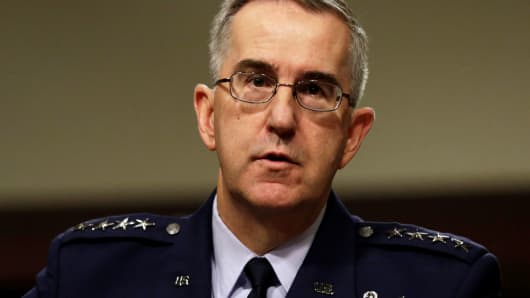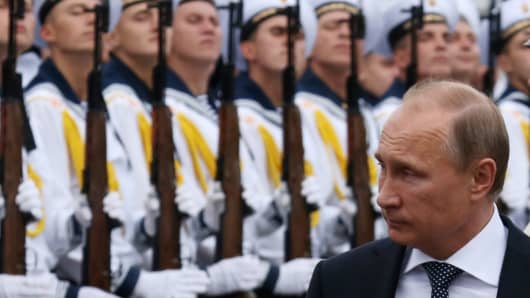China and Russia are 'aggressively pursuing' hypersonic weapons, and the US can't defend against them, top nuclear commander says
- America's top nuclear commander said the U.S. doesn't have defenses against hypersonic weapons.
- "Both Russia and China are aggressively pursuing hypersonic capabilities," said Gen. John Hyten, commander of U.S. Strategic Command.
- Earlier this month, Russia announced a slew of new nuclear weapons as well as hypersonic missiles.

Yuri Gripas | Reuters
U.S. Air Force General John Hyten, Commander of U.S. Strategic Command, testifies in a Senate Armed Services Committee hearing on Capitol Hill in Washington.
America's top nuclear commander described a grim scenario for U.S. forces facing off against a new breed of high-speed weapons that Russia and China are developing.
"We don't have any defense that could deny the employment of such a weapon against us," Air Force Gen. John Hyten, commander of U.S. Strategic Command, told the Senate Armed Services Committee on Tuesday. This means that, as of now, the U.S. has to rely on deterrence against these so-called hypersonic weapons, he said.
Sen. Jim Inhofe, R-Okla., then asked the general to explain what a hypersonic weapon is and what it does.
"A hypersonic threat is a system that starts out ballistic, so you'll see it like a ballistic missile, but then it depresses the trajectory and flies more like a cruise missile or airplane," Hyten said. "It goes up into the lower reaches of space and turns immediately back down and then levels out."
At that point, Hyten said, the weapon will fly at very high speed, which is where the term hypersonic comes from.
"Both Russia and China are aggressively pursuing hypersonic capabilities," Hyten told Inhofe. "We've watched them test those capabilities."
While the Defense Department's latest budget request of $686 billion emphasizes a plan to offset emerging threats from Russia and China, it is clear that the U.S. lacks the means to combat hypersonics.

Sasha Mordovets | Getty Images News | Getty Images
Russian President Vladimir Putin visits the destroyer Vice-Admiral Kulakov at the Naval Base of Black Sea Fleet on September 23, 2014 in Novorossiysk, Russia.
Hyten, who has previously called Russia the "most significant threat" to the U.S., emphasized the need for the U.S. to add another type of nuclear weapon to its arsenal.
"I strongly agree with the need for a low-yield nuclear weapon," he said of the Pentagon's request for a low-yield warhead for submarine-launched ballistic missiles. "That capability is a deterrence weapon to respond to the threat that Russia, in particular, is portraying. President [Vladimir] Putin announced as far back as April of 2000 that the Russian doctrine will be to use a low-yield nuclear weapon on the battlefield."
Hyten's comments came ahead of President Donald Trump's announcement that he plans to "get together in the not-too-distant future" with Putin in order to discuss the international arms race.
Earlier this month, during a two-hour state-of-the-nation speech, Putin announced a slew of new nuclear weapons as well as a hypersonic missile.
Putin's speech cited other nations' actions as a key factor in supercharging Russia's arsenal.
"I want to tell all those who have fueled the arms race over the last 15 years, sought to win unilateral advantages over Russia, introduced unlawful sanctions aimed to contain our country's development: All that you wanted to impede with your policies have already happened," Putin said. "You have failed to contain Russia."
The intercontinental hypersonic missile, dubbed Avangard, is capable of reaching targets at 20 times the speed of sound and will strike "like a fireball," Putin said.
No comments:
Post a Comment